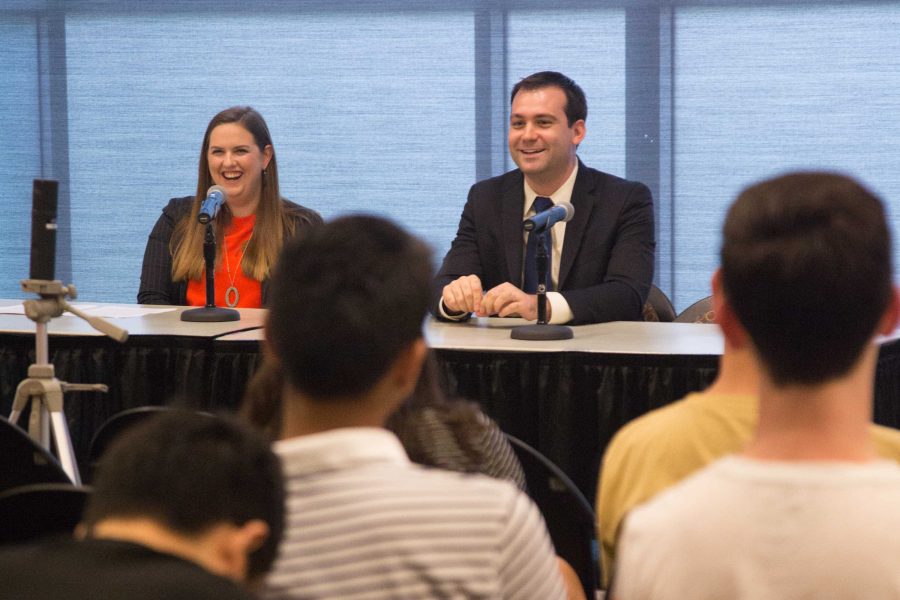In observance of Constitution Day on Monday, The Commons and Vanderbilt Student Communications hosted “The White House and The First Amendment,” a discussion about executive power and the First Amendment from the perspective of members of the national media. The discussion featured Washington D.C. reporters and Vanderbilt alumni Michael Warren (‘10), senior writer at The Weekly Standard, and Jillian Hughes (‘11), White House producer at CBS News, and was moderated by Vanessa Beasley, Dean of the Ingram Commons. The Vanderbilt Hustler sat down with the three prior to the event to discuss their time at Vanderbilt, the current White House and First Amendment rights on college campuses.
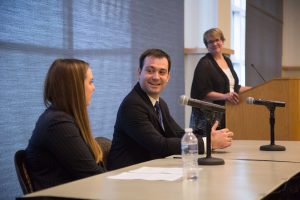
Vanderbilt Hustler: What should students know about today and First Amendment rights in general?
Dean Vanessa Beasley: In the class that I teach, one of the things that we talk about a lot is the need for some sort of balance and for citizens to recognize the balance, that on one hand we have a democracy, we want it to thrive, but there’s nothing in the Constitution except for the First Amendment that protects the press, to the extent that we have a set of assumptions, about the press being a watchdog, about the press holding government accountable at any level, about the press having a call to public service. Even the ideological venues of the press feel that call, like we want people to know things that we care about so you can understand when you need to call somebody about something, at the most basic level. So as a citizen you need to understand that there’s no guarantee that the watchdog function is going to happen unless we protect those First Amendment rights. It’s really really important.
Michael Warren: I worry a lot less about the First Amendment being under assault and more about the norms associated with the First Amendment—that we get into a situation in which the press doesn’t view itself appropriately, or because of the way the president treats the press, begins to view their role differently or there’s like a million different press outlets now and they get to do things that I would say are not necessarily ethical journalism, I’m writing about that right now, about people just making up stuff, and it’s those norms that more worry me. The First Amendment is one of these things that isn’t going anywhere and it’s more about how do we use it.
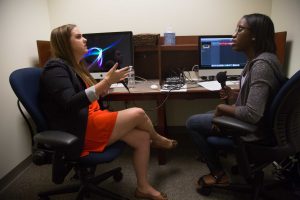
VH: Recently there has been a lot of national attention on free speech and college campuses, particularly around things like who can come speak or if students can protest these speakers. Does this feel like a recent trend or is this something you noticed during your undergraduate days?
Jillian Hughes: I don’t think that’s a recent trend. When I was an undergrad there were examples out there of particular graduation speakers, I don’t know if Vanderbilt has changed their policy at all, but when I went to school here we didn’t have an official graduation speaker. We had someone that spoke the day before graduation, but there wasn’t anyone who actually spoke at commencement. I’m not sure if that was a conscious decision or not, but there was definitely, particularly surrounding graduation, there were definitely different parts of the student body that didn’t want so-and-so speaking at the graduation. I wish I could come up with a specific example, but that I don’t think is a new phenomenon.
MW: It’s definitely different. I’m very glad and grateful that it’s not this way at Vanderbilt, at least it hasn’t been, not that I’ve seen, but the sort of illiberal way students, and I think it’s a small amount of students at these colleges, who think that different ideas, ideas that maybe are different than their own, can’t be heard. There’s a very stark line between somebody who comes to a college campus who means to do actual harm, means to start punching people in the First Amendment walking around campus or something, god forbid, even worse, and somebody who says things that you may find disgusting, odious, awful. We have the First Amendment, they should be able to say those things, and we should, particularly I think as educated people, be willing and eager to hear other views, and be willing to challenge those views too in an appropriate way. This is probably outrageous to some college students, but I don’t think ideas and words can hurt people. I think they can only be combatted with other ideas and words.
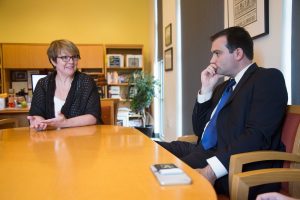
VH: What is it like balancing student voices and comfort with First Amendment rights?
DB: One of the things we always make sure that students understand, or we try to really make sure that students understand when they come to a university is the fact that this is a different kind of space than you might’ve experienced in high school. We take First Amendment rights and freedom of speech very seriously on a university campus, and in fact that’s part of our mission is to welcome ideas and debate and discussion and you don’t have to like something just for it to be heard or even for you to hear it. I think that the comfort piece sometimes gets stereotyped as the thing that would keep you from having First Amendment rights or freedom of speech on campus but I think that’s a false dichotomy. I think it’s okay to be uncomfortable and part of my job as an educator is to lead people through discomfort. If you think about it, you don’t learn very often unless you feel at least some sense of discomfort.
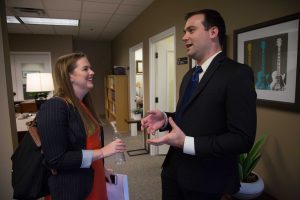
VH: How can students actively engage with their First Amendment rights and do you believe they should?
JH: I’m going to answer this from a student media perspective, from what my wheelhouse is. I think students should constantly be pushing for more access to more administration officials. If something’s going on on campus and you’re doing student media interviews and basically if there’s seemingly something a large portion of the student body is upset about, then members of student media should be pushing for access to their campus officials to ask them questions about what they’re going to do about this problem on campus. It’s similar to what we would do at the White House. If there’s some issue, take the President tweeting that the transgender policy in the military is completely going to change, and he’s just tweeting about it and nobody has any information, no one can explain how it’s changing or when it’s going to change, and how is this going to affect the lives of people who are already transgender in the military. Then, as members of the press core, it’s our responsibility to use our access to the White House to ask where is this policy and what’s going to happen to these people. You should be pushing as much as you can for access to the same types of officials that I would be doing in my job.
MW: Well, you don’t have to. That’s one of the great things about the First Amendment is you can choose not to speak or not to assemble, but I think it’s a good thing, I think it’s a healthy thing for people to do because if you are well-versed and knowledgeable about the Constitution, about the ideas behind it, you’re going to want to say something or you’re going to want to do something. It’s such a broad amendment and it can kind of be narrowed into speech in the media, but I think if more college students, students at Vanderbilt, embrace the idea that everybody is free to speak, to say what they think, that there is no obligation for anyone to listen, we would all be better off by listening to one another. Part of using the First Amendment is being knowledgeable in it, and college is a great time to learn about things. I wish I had read 10 times more than what I actually did while I was here, opportunities to read in your courses, even if you’re an engineering student, read and learn about things. I think being an active learner helps you when you leave college. You take those lessons to be a more active citizen, and that of course means being active in your First Amendment rights.
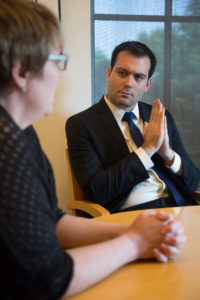
VH: How much power, if any, do you think the executive branch’s attitudes toward the First Amendment has on the general public? Attitudes toward media?
JH: Let’s take the President’s tweets for example, the President will tweet a lot about stories in the media that he doesn’t like sometimes and call them this new phenomenon called “fake news” right? I do think that term has gotten out into the general public a little bit. I would hope that people would take it upon themselves to read a large swath of what’s out there- read CBSnews.com, listen to the radio, read ABC, listen to NPR, read and listen to a bunch of different outlets that are coming from different perspectives and take a cross-section of that and make a judgement for themselves about here is what I think about what is happening in the world. I think that’s the best way to describe how I feel about the administration’s use of that term.
MW: The President is a consumer of media. This idea that the President hates the media, it’s not really true. We published this at the Weekly Standard, and I think it remains true, the leaks of what’s going on in the White House, the number one offender is the President. And then it trickles down from him. I’m all for leaks, it helps me do my job, but all the sort of anti-media stuff is mostly for show. He calls up places like the New York Times and the New York Post, his favorite newspapers, he calls them the failing New York Times, but he loves them. He’s obsessed with them. He loves the media.

Quotes edited for length and clarity.











